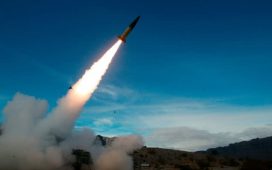Robert Zoellick, a former World Bank president who has served in past Republican administrations, has delivered a public rebuke of Donald Trump’s China policy, warning the president risks pushing Beijing towards a parallel system that would clash with US interests.
Speaking to the US-China Business Council in Washington on Wednesday, Mr Zoellick lamented the White House’s “logic of constant confrontation” with China, calling it ineffective and based on faulty reasoning.
“I understand many of today’s complaints, but we are at serious risk of losing sight of American aims and how best to achieve them,” Mr Zoellick said.
In rejecting the notion that China could play a “constructive role” in a US-led international order, the Trump administration’s policies were in danger of “prodding China into championing a parallel, separate system, with very different rules”, he said.
Mr Zoellick said the decoupling of the technology sectors in the two countries was becoming a reality but there had to be limits. “We would be foolish to place all Chinese students who come to America, or even Chinese-Americans, our fellow countrymen and women, under a veil of suspicion,” he said.
The remarks by Mr Zoellick, a former Goldman Sachs official and US trade representative and deputy secretary of state under George W Bush, came at the latest tricky juncture in relations between the world’s two largest economies.
US and Chinese trade negotiators are trying to seal a truce in their 20-month-old trade war before a new round of tariffs is imposed by Mr Trump on December 15, with the US president sending conflicting signals on the likelihood of an agreement during his visit to London for the Nato summit. At the same time, there are growing fears about the intensifying geopolitical rivalry between the two countries.
Mike Pence, the US vice-president, said in October that China’s behaviour had become increasingly “aggressive and destabilising”, as it slashed “rights and liberties” in Hong Kong, built a “surveillance state unlike anything the world has ever seen”, continued to “aid and abet the theft of our intellectual property” and pursued military expansionism.
Since March 2018, the Trump administration has placed tariffs on $360bn of Chinese goods and put several big Chinese technology companies on an export blacklist that prevents US companies from doing business with them. The moves have mostly gained bipartisan support on Capitol Hill, where the number of lawmakers who could be described as China hawks have been steadily rising.
Although many in the US business community have bristled at the tactics adopted by Mr Trump, many executives have hoped his approach might lead China to address their grievances regarding doing business in the country, including restricted and discriminatory market access, the forced transfer of technology and cybertheft.
Mr Zoellick said the challenges of US-China relations “fit poorly with bombast and tariff barrages”.
“The speeches of administration principals herald rivalry, but with no sense that the United States can shape China’s international behaviour — whether through diplomacy, negotiation, competition, building coalitions to pressure Beijing or deterrence,” he said.
Mr Zoellick, 66, is now a senior counsellor at Brunswick, the advisory firm. In response to a question, Mr Zoellick said he did not have any Chinese clients. Brunswick clients include some Chinese businesses, but it does not advise governments.
Mr Zoellick’s comments may find sympathetic ears at the US-China business council, which represents many large US companies with operations in China. While some members of the US administration, such as Steven Mnuchin, the Treasury secretary, have been more receptive to the moderate messages coming from establishment Republicans and some members of the business community about China, others, such as Peter Navarro, the White House manufacturing aide, say Mr Trump’s goal has always been to upend the traditional policy of engagement towards Beijing.
Mr Zoellick insisted that those who believe China is only a “disrupter” were “misleading themselves, and self-deception is dangerous in diplomacy”.
“We are now witnessing just the vanguard of woes for America, China and the world, if the two major powers slide into mutual animosity and zero-sum calculations,” he said. “We need to be clear-eyed about the real strategic challenges that China presents and disciplined not to distract with blanket blasts that will probably lead to misjudgments and mistakes.”
Critics of previous US administrations’ more conciliatory stances towards China say former officials often fail to offer an effective alternative to Mr Trump’s hardline approach. Mr Zoellick said it should be centred on “calibrated, continuous pressure and negotiations” with countries that share US concerns.
But he lamented that “many are wary because they are too busy defending themselves from administration assaults on everyone’s trade”.








